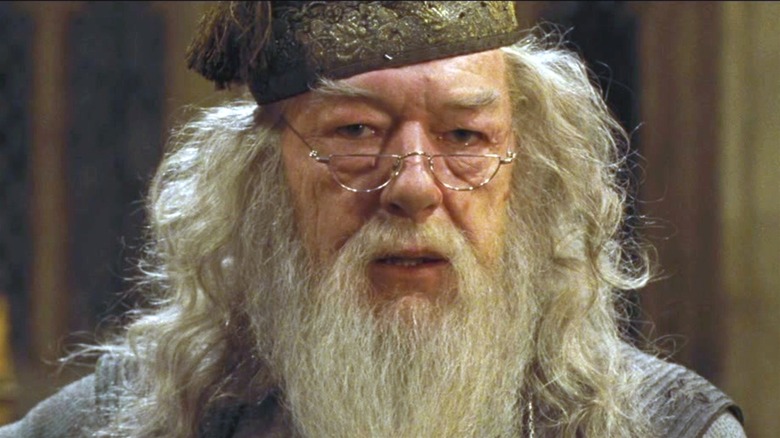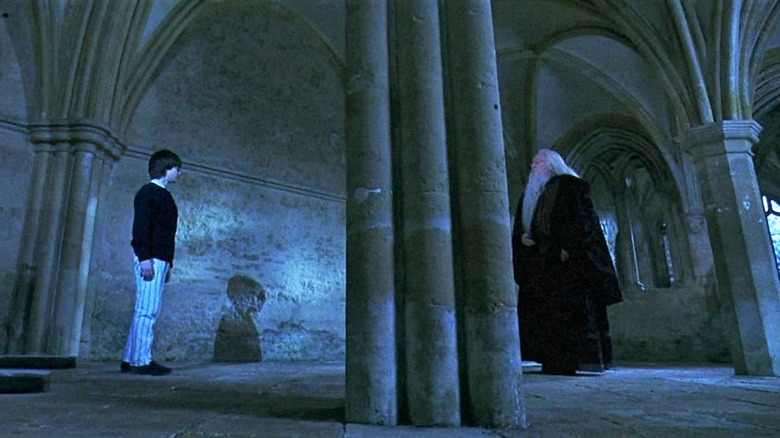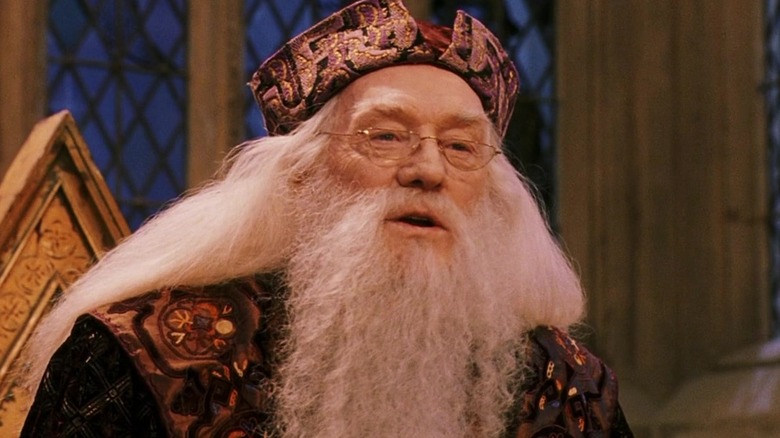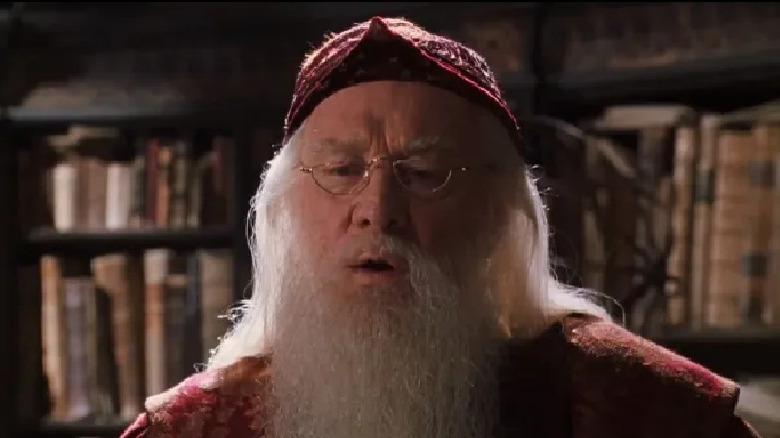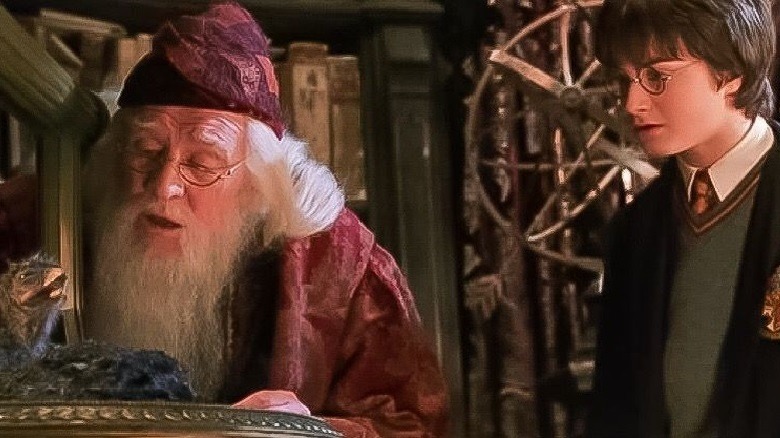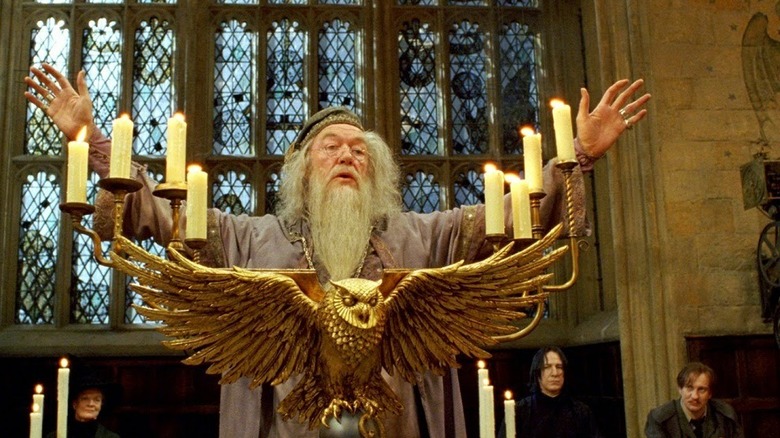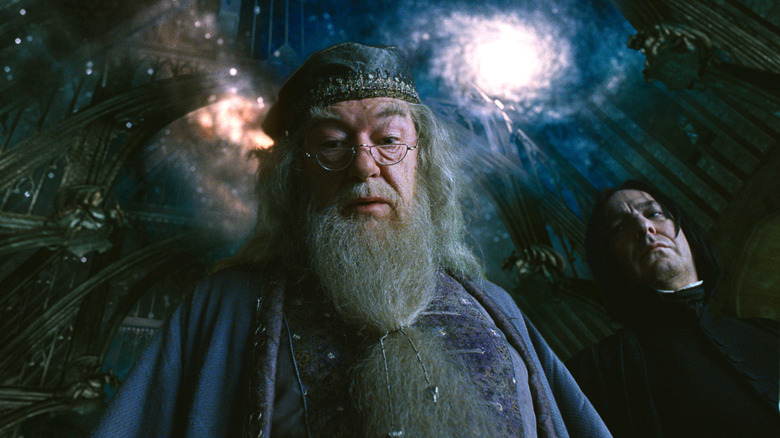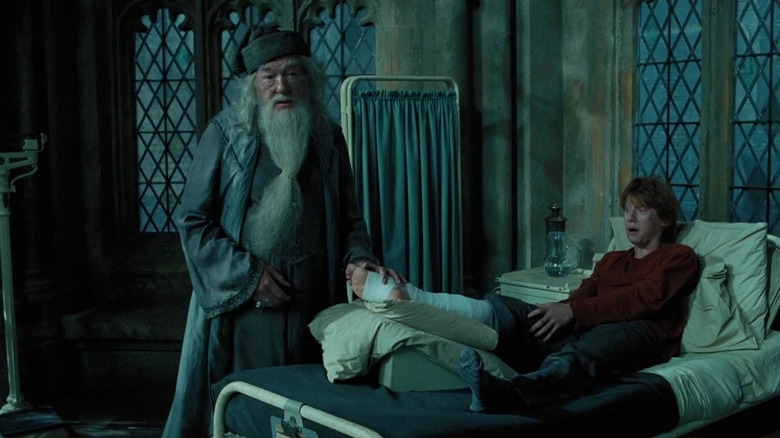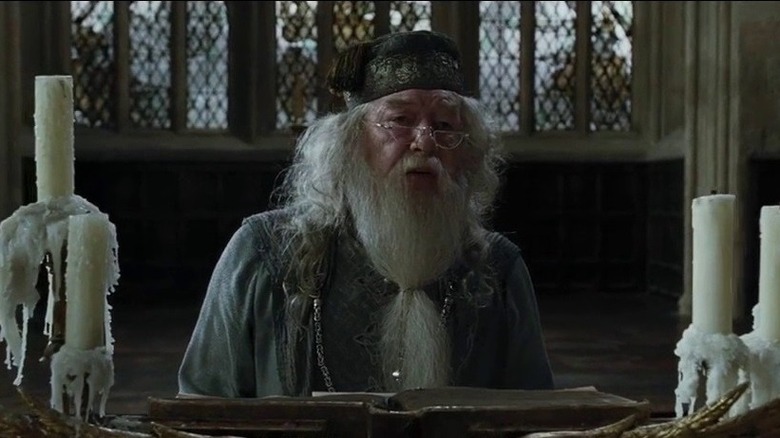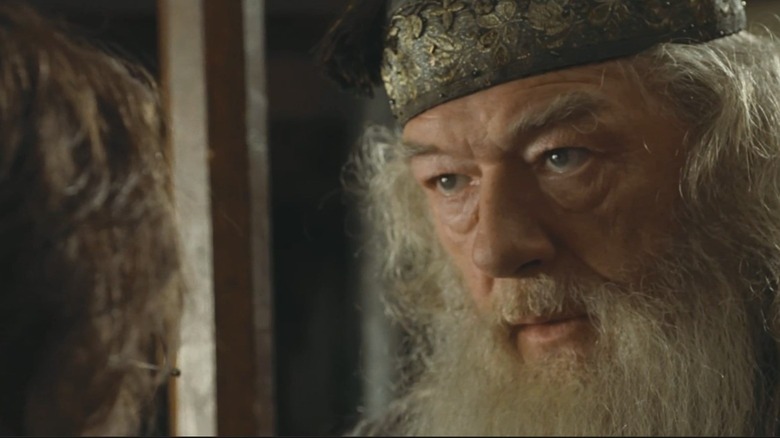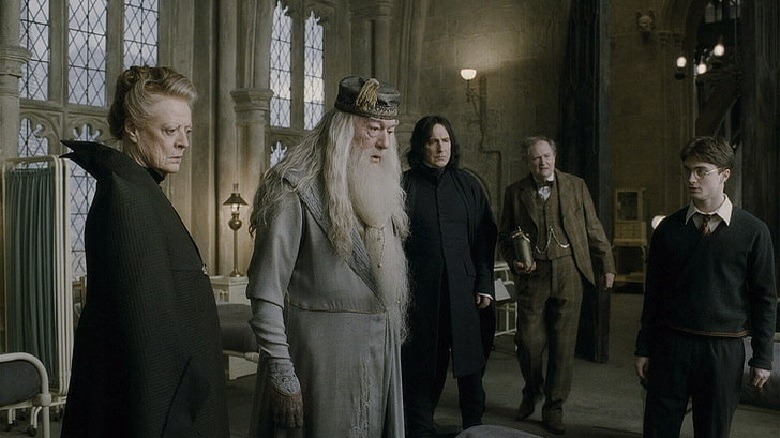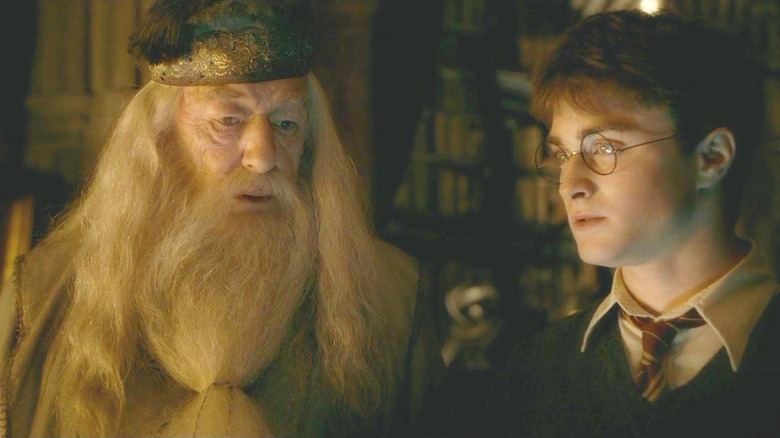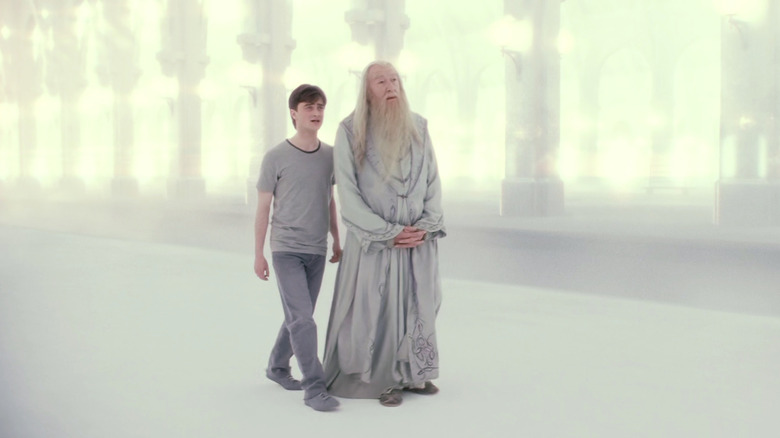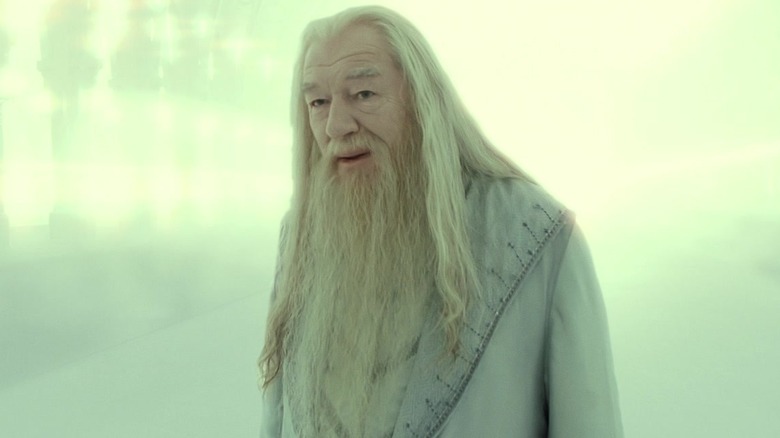Most Memorable Dumbledore Quotes In The Harry Potter Movies
Of all the characters in the "Harry Potter" universe, the one you can always rely on to impart some well-timed words of wisdom is Hogwarts headmaster, Albus Dumbledore. Arriving at Privet Drive to deliver the infant Harry Potter to his relative's house, Dumbledore is the first character we hear speak in the opening scene of "Harry Potter And The Sorcerer's Stone," and from that point, he continued to be an incredibly influential character, particularly for the boy wizard.
Even when he was absent, Dumbledore's words continued to steer Harry, and there's a very strong argument that he would not have been able to succeed in the same way had it not been for Dumbledore. As well as being a powerful and influential wizard, Dumbledore's kind nature ensured he was beloved by students and teachers alike – unless, of course, you're in Slytherin house.
The words spoken by Dumbledore not only hold weight within the movies themselves but can be inspiring and potent proverbs outside of the wizarding world for us non-magic folk as well. More than any other character in this universe, there is a philosophical nature to Dumbledore's phrases, spoken by someone who has lived a long life and learned many lessons from his varied experiences. These are just some of Dumbledore's most memorable quotes from the "Harry Potter" films.
When he tells Harry Potter 'not to dwell on dreams'
When Harry arrives at Hogwarts School of Witchcraft and Wizardry, he is completely new to the world of magic, and the young boy's curious nature leads him to discover many of the castle's deep secrets. One of these is the Mirror of Erised, a magical object that allows you to see the deepest desires of your heart. For Harry, tragically, the mirror allows him to see his parents, who died when he was a baby.
The sacrifice of Harry's parents proves to be hugely significant in his journey; however, Dumbledore recognizes the dangers of dwelling on the past and offers the following words of wisdom: "It does not do to dwell on dreams, Harry, and forget to live." For Harry, these words imply that, while his past is important to him, he should not be looking back, but instead looking forward.
For the audience, this powerful sentence is a timely reminder not to dwell on the past — whether that is mistakes or tragedies like Harry's — as too much time spent doing this can result in you not being present and forgetting that life exists in the here and now.
The reminder to always stand up for what is right
Without getting into the blatant favoritism at the end of "The Sorcerer's Stone," when the tides are turned at the last minute allowing Gryffindor to win the House Cup, Dumbledore declares, "It takes a great deal of bravery to stand up to your enemies, but a great deal more to stand up to your friends." Of course, these words have particularly strong implications for a certain character. Neville Longbottom has so far been a figure for ridicule, with his classmates mocking his forgetfulness. When Harry, Ron, and Hermione are sneaking out of the dormitory at night to find the Sorcerer's Stone, however, Neville decides he has had enough of their rule-breaking and decides to do something about it.
Bravely standing up to the trio and even appearing willing to fight to stop them, Neville sadly loses to Hermione's superior intellect and is frozen with a spell. The good news is that Neville's bravery doesn't go unnoticed, and when Dumbledore is handing out the last-minute awards, Neville is recognized for his actions, giving Gryffindor the crucial points they needed to secure the victory.
Dumbledore's words have truth to them and are particularly sage advice about the benefits of always standing up for what is right, regardless of who it pits you against. By the end of the series, Neville becomes a genuine hero, boldly standing up against Lord Voldemort. Perhaps it was these words from Dumbledore that empowered Neville to become the person we always knew he could be.
The reassurance that Hogwarts will always help those who need it
With Hogwarts no longer deemed safe in "Harry Potter And The Chamber of Secrets," Dumbledore is removed from the school by the vindictive Lucius Malfoy, purportedly acting on behalf of the governors. When he and the Minister of Magic arrive at Hagrid's hut to remove Dumbledore, both are unaware that Harry and Ron are also in the hut, shrouded by the invisibility cloak.
With that trademark twinkle in his eye, Dumbledore muses, "You will find that help will always be given at Hogwarts to those who ask for it," in the direction of Harry and Ron, seemingly aware of their presence. Dumbledore's words at this moment need to be deliberately obtuse so as not to arouse suspicion from Lucius and the Minister, yet also simple enough so that Harry can deduce the meaning from them.
While the intention behind this statement might not seem obvious at first, it seems to be offering a reassurance that even if not physically present himself, there will be those at Hogwarts who can help Harry should he need it. It also seems to suggest that those with good intentions behind their actions will be rewarded — something that we see later in the film when Fawkes (Dumbledore's phoenix) comes to Harry's aid.
The significance of our choices
During his second year at Hogwarts, it becomes clear that Harry shares some of the same skills as Voldemort — one of these being the ability to communicate with snakes. With Harry having just defeated the young version of Voldemort and the giant basilisk, he reflects on the ways he is similar to the evil wizard.
As well as being able to talk to snakes, both were orphans, and both — as Dumbledore points out — had a certain talent for breaking the school rules. Harry is still young, still finding himself and his place in this world, and is troubled by the idea that he could be on a similar path to Voldemort. As always, Dumbledore has just the right words to say to reassure him. "It is not our abilities that show what we truly are. It is our choices," he explains, letting Harry know that it doesn't matter about their similarities, as the crucial element that defines a person is the choices they make.
The wise professor relates this to Harry's sorting ceremony, where it seemed for a moment that he would be sorted into Slytherin. Harry, desperate not to be sorted into this house, had whispered "not Slytherin." The Sorting Hat took Harry's choices into account and placed him in Gryffindor, emphasizing the truth of Dumbledore's words and how important it is that a person "chooses" their path.
Dumbledore's reminder that hope is never lost
This quote from "Harry Potter And The Prisoner Of Azkaban" is perhaps one of the most famous spoken by Dumbledore and is one that fans have particularly taken to heart. In this third installment in the "Harry Potter" series, events take a noticeably darker turn, with Dumbledore saying in his opening speech, "Happiness can be found even in the darkest of times when one only remembers to turn on the light." Of course, this becomes particularly potent to the students.
Interpreting this in a literal sense, if you find yourself in a dark room with little or no light, it can seem scary. With no idea what is around you, it can be disorienting and frightening, however, if you manage to find the light, this can all go away, and you can see clearly what is ahead of you. In a more metaphorical sense, this quote can speak to a more complex emotional place; when things seem dark and distressing, Dumbledore emphasizes that light — or happiness — can always be found.
The idea of light being something that counteracts the darkness is something we see much later in the series when Dumbledore is tragically killed. With the dark wizards sending their symbol up unto the sky, those mourning below hold their wands aloft, and the light from them vanquishes the darkness. This poignant scene supports the power of Dumbledore's earlier words and is a salient reminder to us all that hope is never lost as long as you remember it exists.
The nostalgic connection between dreams and escapism
In "Harry Potter And The Prisoner Of Azkaban," the entire school is at risk when it seems that escaped murderer Sirius Black has made it into the building. With all of the students forced to sleep in the Great Hall to keep them safe, Dumbledore and Snape converse about whether to warn Harry about something pertaining to Black. "For in dreams, we enter a world that is entirely our own. Let him swim in the deepest ocean or glide over the highest cloud," Dumbledore notes.
What the professors do not know is that Harry is awake and listening to their conversation; however, neither of them disclose any more information and Dumbledore says it is best to let him sleep. Harry is now a teenager, is growing more aware of the dangers around him, and is no longer that small boy that Dumbledore can so easily protect.
This quote from Dumbledore is particularly wistful and melancholic. In the hope that Harry is blissfully sleeping, Dumbledore muses on how our dreams can be escapism from the darkest times, allowing us to be in our own world and achieve things that can't be done in real life. The lullaby-esque score in this scene also emphasizes the nostalgic feeling behind Dumbledore's words and is a rare moment of peace in an otherwise very dark story.
Dumbledore's time-traveling advice
After the truth about Sirius Black is exposed, our heroes learn that it was Peter Pettigrew (who had lived for many years in the form of Ron's pet rat) that betrayed Harry's parents to Voldemort. Unfortunately, Pettigrew managed to escape, and with him went the hopes of being able to clear Sirius' name. Although Dumbledore believes our heroes, he relays that not everyone else will be so easily persuaded. As the clock chimes, however, Dumbledore seems to have had some inspiration about how they can change what has happened.
Instructing Hermione to use her time-turner so that they can go back and potentially save Sirius, Dumbledore ponders over the idea of time itself in a line that wouldn't be out of place in a science-fiction time-traveling movie. "Mysterious thing, time. Powerful, and when meddled with, dangerous," he tells Hermione and Harry, encouraging them through a cautionary warning.
Hermione may have been using the time-turner all semester to attend more classes. However, this is the first time that its use has had particularly life-altering consequences. Dumbledore's earlier words about dwelling on the past and forgetting to live also come back into mind, and he wouldn't be allowing them to do this if he didn't think it was the only course of action.
Dumbledore's reminder of the significance of unity
Much of the plot for "Harry Potter And The Goblet Of Fire" revolves around the Triwizard Tournament, where three magical schools compete for glory by taking part in a number of dangerous challenges. Historically only one champion has been selected to represent each of the schools; however, due to some meddling from an imposter, Harry is also chosen to compete.
The final challenge sees the champions facing a bewitched maze, with the goal being to try and find the Triwizard Cup in the center. Harry and Hogwarts' other champion — Cedric Diggory — reach it at the same time. Sadly, their hopes of sharing the victory are destroyed when they suddenly find themselves facing Voldemort. When Cedric is callously killed by Voldemort, Harry is left devastated, as is the entire crowd when they see what has happened.
With all of the schools gathered in the Great Hall, Dumbledore pays tribute to Cedric with an emotional speech. In this instance, Dumbledore chooses to speak very directly, telling them exactly how he was killed. Speaking to the collective pain that all the pupils are experiencing, Dumbledore says, "While we may come from different places and speak in different tongues, our hearts beat as one." Not only are Dumbledore's words comforting to the pupils grieving Cedric, but they are a reminder to us all of the importance of togetherness in times of hardship.
His warning of 'dark and difficult times'
Towards the end of "Harry Potter And The Goblet Of Fire," we witness the terrifying return of Lord Voldemort — an event that changes everything in the wizarding world. Speaking to Harry in the final moments of the film, Dumbledore doesn't hold back in letting him know the truth — that bad things are going to happen, and as a result, difficult choices will have to be made. "Dark and difficult times lie ahead. Soon we must all face the choice between what is right and what is easy," he warns.
In many ways, this conversation is similar to the one between Harry and Dumbledore in his office at the end of "Harry Potter And The Chamber Of Secrets," where the headmaster emphasizes the great importance of a wizard's ability to "choose" their destiny, should they wish. In this line, however, Dumbledore goes one step further. Rather than a straight choice between good and bad, the path may also have many subsequent forks and branches, with each choice having a "right" option and an "easy" option.
As Harry matures, the way Dumbledore speaks to him also changes. Harry frequently wrestles with his past and his destiny, and Dumbledore's guidance constantly steers him. The things Dumbledore says to Harry frequently build on previous pearls of wisdom, just as Harry's knowledge and grasp of his life's meaning develop over time.
Dumbledore's cheeky take on love
As well as being incredibly wise, Dumbledore also has a wicked sense of humor, and of all his witticisms, this is one of the very best. In "Harry Potter And The Half-Blood Prince," the students are now 16 years old, and like any regular high school, dating suddenly becomes very important, along with their magical studies. Many of the students embark on their first romantic relationships, and Ron starts to date Lavender Brown, a slightly overbearing — but mostly well-intentioned — fellow Gryffindor.
When Ron is unwittingly poisoned, Lavender rushes to his side, and there is a slightly tense stand-off between her and Hermione, who is not-so-secretly in love with Ron also. With the two having a very public argument over Ron's affections, the professors look on in amusement. When Ron stirs and calls for Hermione, Lavender rushes out in tears as Dumbledore delivers the quip, "Oh, to be young and to feel love's keen sting." Given what comes later in the film, this brief, light-hearted moment is even more welcome, and it perfectly demonstrates the cheekier side of Dumbledore as well.
When he asks 'too much' of Harry Potter
While "Harry Potter And The Half-Blood Prince" has many light-hearted moments, it also has immense sadness, and tragically it is the film where Dumbledore is killed by Professor Snape. Before this, Dumbledore and Harry uncover the truth of the dark magic that Voldemort had asked Professor Slughorn about in his school years. Known as Horcruxes, these magical objects are used to store a part of someone's soul to achieve immortality.
Now knowing that the only way to defeat Voldemort is to find and destroy the Horcruxes, Dumbledore informs Harry that he knows where another one may be hidden, but that this time he cannot go alone. "Once again, I must ask too much of you, Harry," Dumbledore softly says. It is clear throughout the series how fond Dumbledore is of Harry, and in this film, there is also a sense of resignation in Dumbledore — almost as if he knows something bad will happen, and this particular line is inflected with a sense of guilt at having to ask Harry to go with him.
Despite the number of dangerous situations Harry has faced over the years, this one seems to be taking a particular toll on Dumbledore, and he acknowledges the anguish he feels at once again having to put Harry in harm's way. It is also a moment that becomes even more meaningful when you learn exactly what Dumbledore has to ask Harry to do when they arrive at the cave.
Explaining that words are the 'inexhaustible source of magic'
Even after his death, Dumbledore continues to provide a source of inspiration for Harry. With the Horcrux part of Harry now seemingly destroyed by Voldemort himself, Harry finds himself in an ethereal Kings Cross Station where he finds Dumbledore. "Words are, in my not-so-humble opinion, our most inexhaustible source of magic. Capable of both inflicting injury and remedying it," he memorably notes.
What is most notable about this conversation is that before this, Dumbledore quotes himself to Harry, saying, "Help will always be given at Hogwarts to those who deserve it." When Harry appears to be confused about what Dumbledore means, the headmaster compliments his own ability to turn a phrase before going on to explain the power that words hold.
Speaking in the very literal sense, in this world, they have spells and incantations with both the power to injure and remedy, as Dumbledore says. Exploring the deeper meaning, this quote highlights the importance of words and communication more broadly, and particularly the value of choosing the right words because they can hold so much power.
Dumbledore's reminder to 'not pity the dead'
As Dumbledore imparts his final words of wisdom to Harry before he returns to face Voldemort, he somberly tells the young wizard, "Do not pity the dead, Harry. Pity the living and above all, those who live without love." Echoing his earlier sentiments about not dwelling in the past, Dumbledore reminds Harry not to pity those who have already died. He could perhaps be talking about himself, those close to Harry who passed away, or the many that have been killed fighting Voldemort in the Battle of Hogwarts — either way, it's a prompt for Harry to focus on those who are still alive.
The idea of having "pity" for the living is also tinged with some sadness, as it implies that the dead may no longer be suffering, but the living are — and because of this, they are deserving of compassion. It is a hard lesson for Harry to learn as he has experienced so much death from a very young age, and it marks a significant development from being told not to "dwell" on death to being instructed not to "pity" those who have died.
At this point, Harry still has the choice to live or die, and this quote from Dumbledore also suggests that Harry's mission is not complete yet, subtly encouraging him that he needs to return. Showing compassion and proving that goodness and love can triumph over evil is the core message of the "Harry Potter" series, perfectly encapsulated in these words from Dumbledore.
